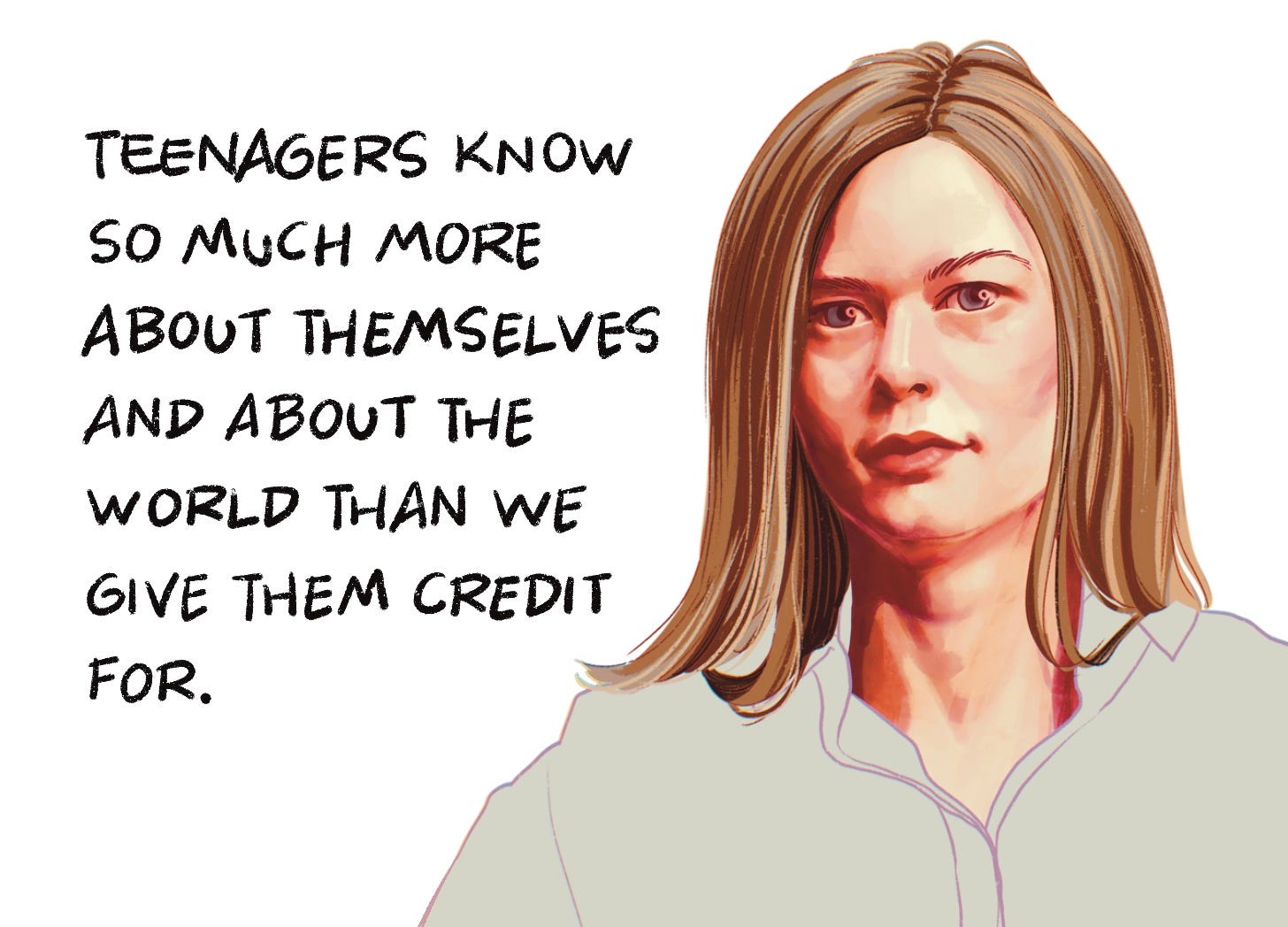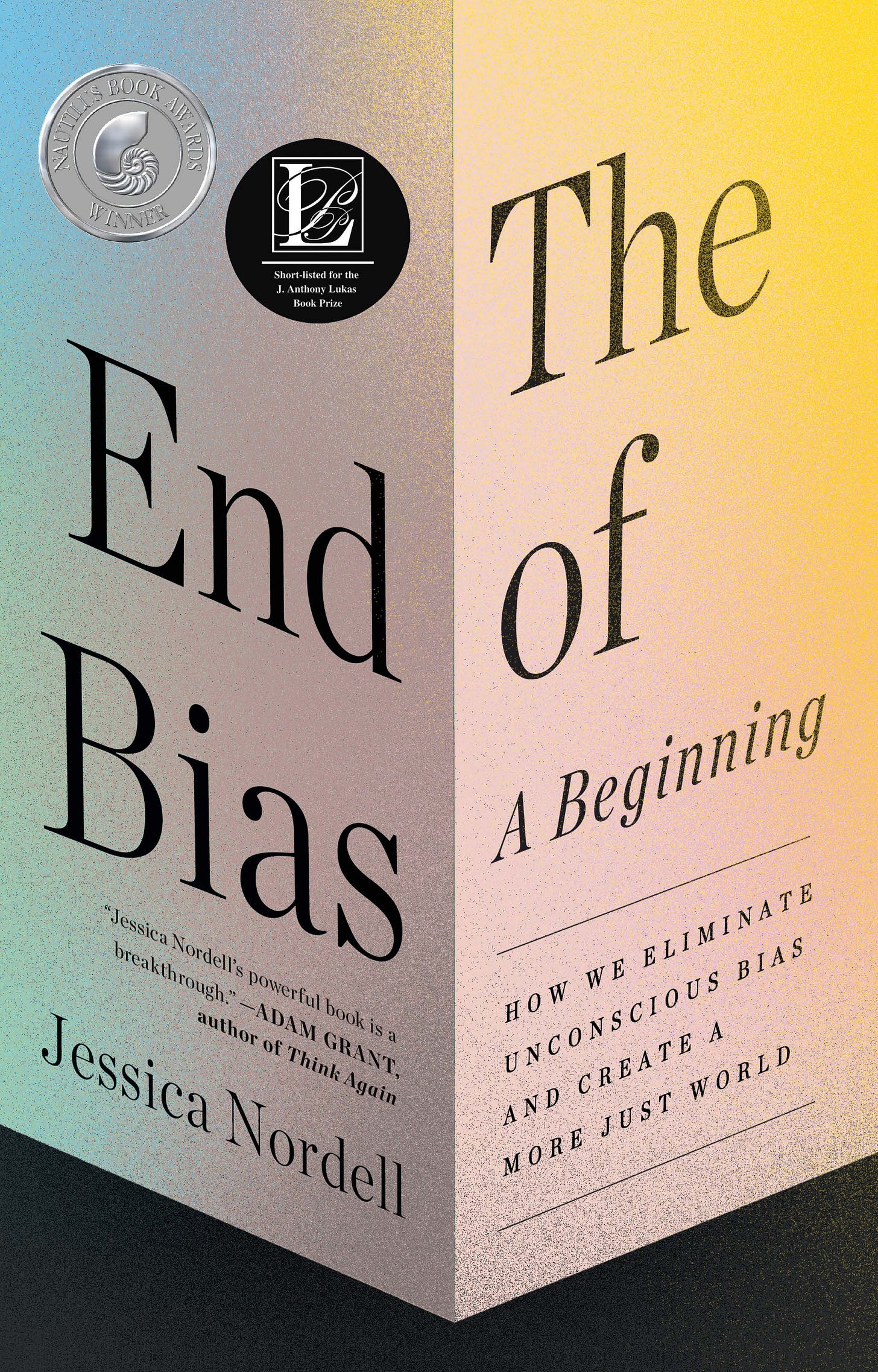How Do We Support a Suffering Teenager?
On love, curbing self-harm, and the lengths we'll go to to save ourselves
Dear friends!
If you read the bullet points on Emi Nietfeld’s resume, here’s what you’d see: boarding school, Harvard, a job at Google, an address in the West Village. Here’s what you wouldn’t see: a childhood home stuffed with garbage, without water or heat. Foster care. Homelessness. And also: self-harm, months in a locked psych ward, 13 psychiatric diagnoses. Ultimately, Emi—possessed of a will like a concrete pylon— catapulted herself out of her childhood and into an adulthood of health and joy. She tells her story in her gorgeous memoir Acceptance. Here, we talk about unlabeling oneself, wanting to be known, and the risks of being loved. (Warning: this interview contains discussion of self-harm and suicidality.)
When we grow up in a particular reality, that becomes our “normal.” When did you realize something was really wrong about your situation?
That’s a great question. I had this sense that if somebody just came and looked around our apartment, they would immediately know something was wrong. I didn't have words for it, in part because the word “hoarding” was not a part of the vocabulary.
How do you now understand your mom's pathological behavior?
Her parents were abusive, and it left my mom with deep scars. Success meant moving on and pretending it didn't happen. She could not see her own issues. So she brought me to all these therapists and told them, "My daughter has ADD, my daughter is really unwell." Unfortunately, she was convincing.
It reminds me of the idea of “the identified patient." In a dysfunctional family, it’s often a child who expresses unusual behaviors or emotions. That child is seen as the source of problems instead of an expression of the family's dysfunction.
That resonates so much.
I requested the medical records, and a lot of the doctors and therapists could see she had major issues. One note said, "The patient's mom is giving her leftover Adderall. So I wrote her a prescription if she agreed to stop giving her leftovers." That’s how I was put on Adderall—my mom was giving me her 20-year-old speed pills.
Wow.
These people were doing the best that they could, given that they did not want to call Child Protective Services. They knew my mom would just go to somebody else if she didn't like the treatment I received.
My mom really considers herself the parent of a former special needs child who could not receive the help she needed. This is her reality.
It's such a stark divide between your reality and hers. Is there any way to bridge those two?
I'm an engineer by training. I investigated every possible bridge. I have concluded that there is no bridge in the logical world.
Part of coming to that realization for me was to read thousands of pages of records. For people who have been gaslit, fact-finding can be so important. We're told, "Trust your feelings." But how are you supposed to do that if you have always been told that your feelings are wrong?
I literally wrote down what happened, and then I would give it to people. I was hoping that they would explain my life to me. And they did.
It can also help to have other people reflect our experiences back to us.
When I started writing my book, I literally wrote down what happened, and then I would give it to people. I was hoping that they would explain my life to me. And they did. Through seeing people's reactions, I realized, "Oh, that's fucked up."
It's essential to put your experience in context. But people with certain stories have a hard time telling them because those experiences strip you of context.
What do you mean by that?
I spent nine months living in a locked facility when I was 14. I was made to feel like I was there because I had been bad. Every night we're having confessions: "Here's what I did wrong. Here's how I'm going to be a better person to earn my freedom." You're made to feel like you are completely responsible for what's going on.
That the problem comes from you.
Exactly.
A lot of adults tried to help, in their own limited ways—whether it was your foster parents or social workers. What would have actually helped you when you were suffering so much?
What a great question. I wish somebody had asked me, "What do you think the problem is? What would be helpful to you?" Children are treated as if they're not really human—that they don't know what's wrong or what they need.
I wouldn't have had all the answers, but people were always asking my mom these questions. Teenagers know so much more about themselves and about the world than we give them credit for. They have an especially acute sense of injustice.
If someone had asked, "What do you want? And how could we help move you towards that?" my teen years would've been very different.
If someone had asked, "What do you want? And how could we help move you towards that?" my teen years would've been very different.
What would have happened? What would you have said?
I would have said, "I want to get out of here. I want to not live with my mom.” I wanted to go away to school as soon as possible. I ended up in boarding school, which was great. Maybe we could have expedited that process.
I was not willing to do a single thing that adults just told me to do, but I was willing to do absolutely anything to achieve my goals. My way out was through college. In hindsight, if people had leveraged that I might've not felt so depressed. I might've been able to stop hurting myself.
From your vantage now, how do you understand your self-harming behavior?
I was desperate for any way to feel better. It did get me through the day. In the long run, it was not helpful because you quickly develop a tolerance. You do it just to feel normal.
I would never encourage somebody to go out and cut themselves. But I also think that sometimes we unfairly make this dichotomy between healthy and unhealthy coping skills. A lot of people use exercise in a way that is harmful to them and will cause permanent injury. They're doing it because they desperately need a way out.
It makes me think about how some people describe suicidal thinking as a way to cope with an unbearable reality. Having those thoughts can feel like a relief, an escape valve. I know people who have used those words.
That tracks. I wonder what would have happened if adults in my life had taken a harm-reduction approach. If somebody had said, "If you're going to do this, here's how to avoid infection," it might have been a deterrent. I would have thought, "I do not want to be having this conversation with my doctor.” It's no longer this secret thing that only I can do.
You had some adults you trusted, like a beloved teacher, Ms. J. But you never told her what was really happening in your life. What were you afraid of?
Being "too much." As a teenager, I needed things from adults that they could not give me. I was looking to teachers to do things my parents should have been doing for me. So I was always worried. To this day, I worry so much about taking up too much of somebody's time.
I wanted my teachers to worry about me. And also, I didn't want them to worry too much. I wanted them to know what was going on, but I also wanted things to be normal between us.
You wanted her to worry about you. You wanted her to know what was going on, but you also wanted things to be normal between you.
Emi, I think you're describing love.
Wow. Yeah.
That's what love is, right? Knowing the truth about someone, and still having everything be okay.
I did love my teachers. And I wanted them to love me back.
Was part of you worried that if someone really knew you, that would change how they felt about you?
Yeah, absolutely.
There's a great line in this book by Miranda July. She says, "In my paranoid world, children and animals see the real me, and it is evil." <Laughs.>
Oh, man, so relatable!
We want so much to be known. And we're afraid that if someone knows us, then they won't love us anymore.
It's much easier as an adult. It was so hard being a ball of feelings—having either an "on" switch or an "off" switch.
I’m so curious about your take on psychiatry. What were some of the diagnoses that you were given?
At one point, I had 13 psychiatric diagnoses. I was a 14-year-old with 13 diagnoses, one per year of life.
If anorexia is a discrete condition, I probably had it. PTSD—I meet the criteria for that one. But I was also diagnosed with borderline personality, a classic diagnosis of people who are being abused. It's like, "Why are you being so emotionally unstable?" "Well, maybe because I live in hell."
I thought if I do have bipolar disorder or some diagnosis that could explain it all, then at least maybe there's hope for me through psychopharmacology.
I was also diagnosed with psychosis. My mom took me to an exorcist. The psychiatrist did not believe that my mom had brought me to a lady's house who “saw the devil” in my soul.
Did you believe the labels?
For a while, I put a lot of stock in them. I thought if I do have bipolar disorder, then at least maybe there's hope through psychopharmacology.
I did not enjoy being labeled as having a budding personality disorder. It felt insulting. And when my mom said, "My daughter has ADD," I was like, "This is crazy."
Your mother said one sign that you had ADD was that you were "hyper-focused" while reading books. That is literally the goal of every author—to have a hyper-focused reader!
Yes. So I was prescribed Concerta and had one of the worst experiences of my life, like holy shit. I did not know it was possible to feel this bad. I felt like I was seeing into this abyss of misery. As an adult, I can't even drink decaf coffee—that is how strongly I react to stimulants.
They said, "She's having a panic attack!" so they gave me Xanax. Then they said, "Well, because you reacted to stimulants with panic, you must be depressed." I thought, "Maybe I am depressed." I hoped that some pill would make me feel better.
You were so young that you didn't know yourself enough to know, "Actually, I feel worse on this drug."
At times, I did feel, "This is not making me feel better." I attempted suicide when I was 13—that was when I was withdrawing from Lexapro. Doctors were like, "There's no such thing as 'antidepressant withdrawal.' You're suicidal. It must be because of you. Now you need an antipsychotic to make the antidepressant work."
Clearly, some of these meds work for some people. But they were not working for me, and nobody would listen.
What’s your perspective on what we call “mental illness”?
One of my most useful college classes was the History of Psychiatry. Before that, I believed that I had been irrevocably mentally ill, and by some miracle, I left my home, stopped taking medication, and became okay. The class opened my eyes to how, with a few exceptions, cultural these definitions are.
Labels can be useful— it was useful to me to seek out treatment for PTSD. But sometimes when we identify with the problem, it makes it harder to solve.
For instance, I had an eating disorder and was hospitalized. It was pretty severe, but I also refused to accept the label. People said, "You are never going to get better if you don't accept it." But actually, it was easier for me to stop doing those behaviors because it wasn't part of my identity.
That is fascinating, Emi.
We have an Alcoholics Anonymous model in the US. You have to say, "I'm Emi, I'm an anorexic." But as soon as you do that, it's part of your identity, and you can't just start eating—you have to confront your entire identity.
There's a beautiful line in Rachel Aviv's book Strangers to Ourselves, inspired by the anthropologist T.R. Luhrmann: "There are stories that save us and stories that trap us and sometimes it's hard to know the difference."
I'm someone who's also been assigned various labels. I'm so interested in the idea that not accepting the label can be helpful—to think, "This is an experience that I'm passing through."
Yes.
Why did you want to share your story?
I thought if I didn't I would actually go crazy.
I was shoved into a lot of narratives: being this sick kid, and then this overcomer who got into Harvard. None described my actual experience, and I was really fighting—how to retain my sense of self when I'm playing this part. I saw writing as my opportunity to tell the truth. And give my younger self back this complexity that had been stripped.
I love the idea of giving complexity back to your younger self, like a gift.
I was at this dinner the other night, and I was asking people about grief, because I'm a fantastic party guest. Someone shared David Kessler’s idea—that grief needs to be witnessed. Maybe that’s why we write memoir.
Yes. And I find so much solace in memoirs, especially brutally honest ones. I wanted to do that for other people and for myself.
When my life turned around and I won awards and got into a prestigious school, I felt like every other person in this situation was this perfect child. And I had shoplifted. I had lied. I had hurt myself. It's important when you're a young person to realize that the newspaper human interest story is different than the reality. Nobody is that perfect child.
This newsletter is free, but if you’d like to support my work, pick up a copy of The End of Bias: A Beginning, my book about how people become less biased and more fair, just, and humane.
Note: I’m currently booking keynote talks for summer through the end of this year. Feel free to reach out at hello@jessicanordell.com







I think your questions were spot on to get to the real truth. The biggest problem in my opinion is no one actually listens…they assume they know what the issues are before you even finish speaking and jump to conclusions…please shut up and listen
As a child of trauma, this interview is very heart-and-mind opening. 🙏🏼 Especially this: "Teenagers know more about themselves and the world than we give them credit for." Helpful as I rewrite my evidence-based graphic novel to support young people who struggle with negative self-talk, "Meet Your Monkeys: Make Friends with the Meanies and Imps that Rule Your Mind." My mantra is "It's not your fault." (ever see the iconic scene in "Good Will Hunting"?). But now you get to learn how to deal with the feelings and thoughts that make life so hard. Well done!